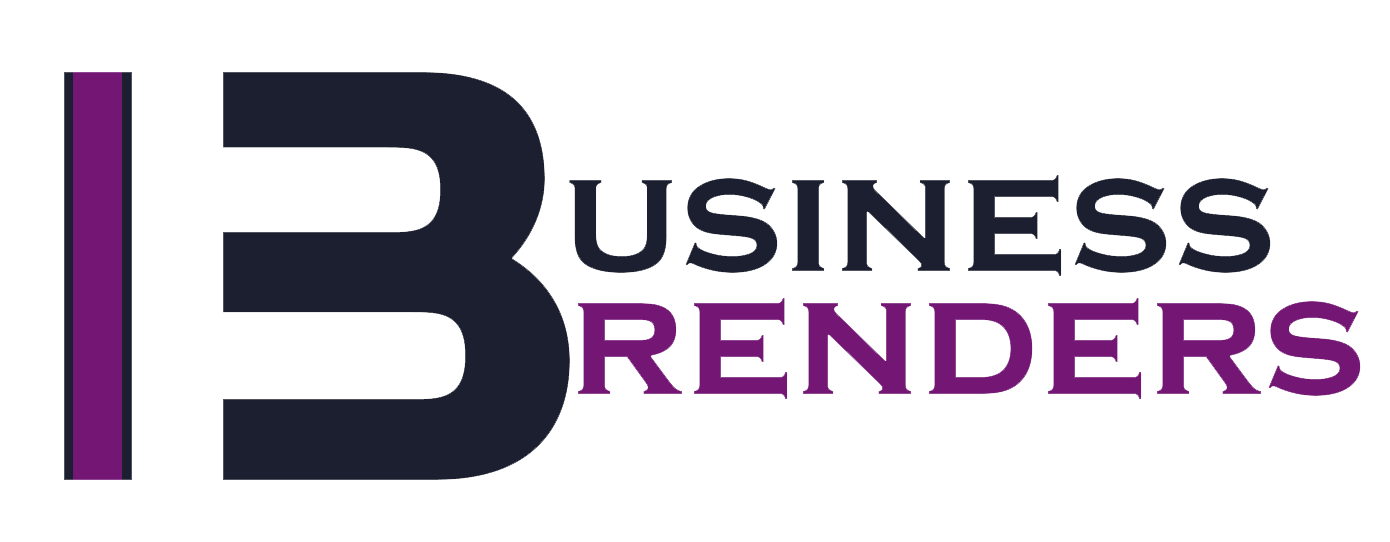Microsoft Dynamics 365 offers several CRM and ERP benefits to its users companies and businesses. However, this versatile tool is not always a great fit for everyone, and some companies still require a better option. If you also own one of those companies and seeking the best Dynamics 365 alternatives, this guide is for you.
Here, we’ve listed the top six competitors of the platform that almost offer the same features and results (some even more) as 365. You will learn about their simplicity, integrations, affordability, and versatility. So, without further waiting, let’s get into them!
A Quick Overview of Benefits
Before we get into Dynamics 365 alternatives, it is better to learn about the benefits of this platform. Of course, it has some flaws, which you can learn in detail in our other guide on Dynamics 365 drawbacks. However, the CRM tool has multiple advantages too. That’s why several companies use Dynamics 365 for their operations. However, let’s get into a quick overview of its benefits:
- Scalability and Flexibility: It’s highly scalable, allowing businesses to start with the applications they need and easily add more as their requirements evolve. It can adapt to various industries and business sizes.
- Enhanced Customer Engagement: Helps in building stronger customer relationships through personalized experiences, streamlined interactions, and a 360-degree view of customer data across touchpoints.
- Cost-Efficiency: Helps in reducing infrastructure costs, as it operates on a subscription-based model, eliminating the need for significant upfront investments in hardware and software.
- Improved Productivity: Offers automation of repetitive tasks, workflow optimization, and easy access to information, empowering employees to be more efficient and productive.
You can learn more about these benefits in detail and get other advantages in our dedicated guide on Dynamics 365 benefits.
Dynamics 365 Alternatives
Although the above advantages can be effective for any business, they may not suit your company. So, if you are still persistent in choosing a better option, here are the top six Dynamics 365 alternatives that you can select. Let’s get into them!
1. HubSpot
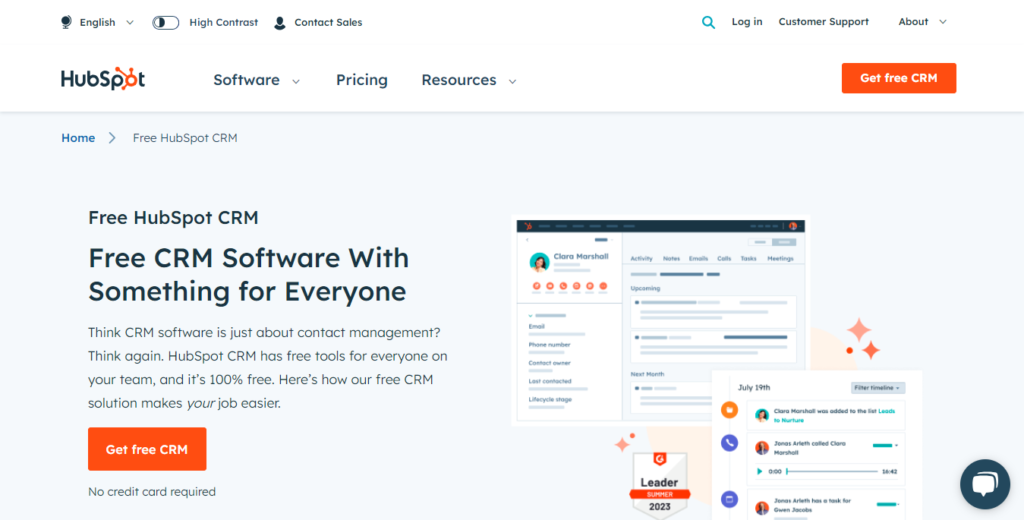
Hubspot CRM is considered one of the best Dynamics 365 alternatives. It is famous for its user-friendly interface and intuitive design. The platform is easy to set up and navigate, making it an excellent choice for small to medium-sized businesses looking for a straightforward CRM solution. Plus, HubSpot offers a suite of integrated marketing, sales, and service tools.
This software’s integration allows for seamless communication and data sharing between marketing and sales teams. Hence, they get highly streamlined processes and improved collaboration. On the other hand, it provides robust automation capabilities, allowing users to automate repetitive tasks, set up workflows, and create personalized email sequences, which can enhance productivity and efficiency.
The free version of HubSpot CRM provides a viable starting point for smaller businesses. It offers essential CRM functionalities without the initial investment that Dynamics 365 demands. Moreover, this CRM is specifically designed with a strong emphasis on inbound marketing methodologies. So, it might align better with businesses prioritizing content-driven and customer-centric strategies.
2. Salesforce
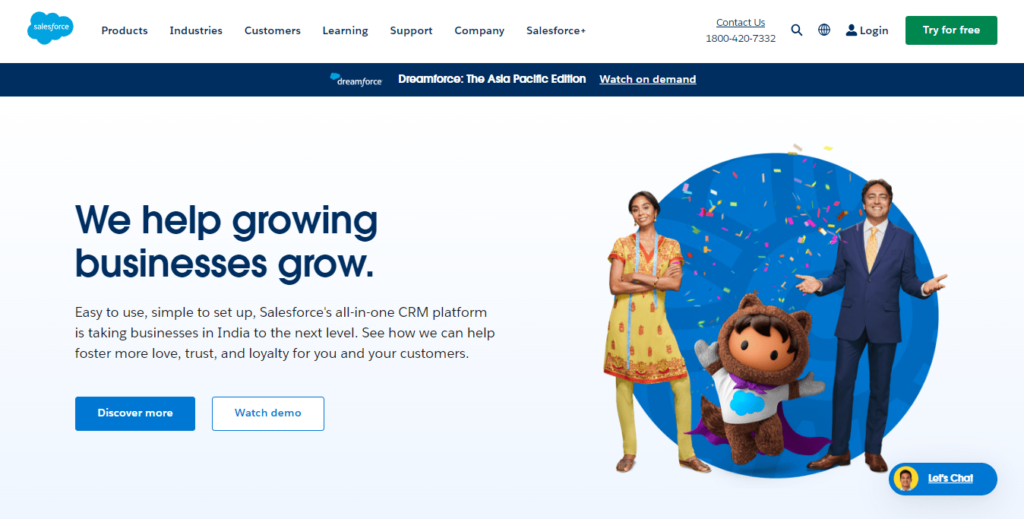
Another one of the great Dynamics 365 alternatives is Salesforce. It offers a high level of customization and flexibility, allowing businesses to tailor the platform to their specific needs. Its AppExchange marketplace provides a wide array of third-party apps and integrations. Moreover, it has a vast ecosystem with a dedicated community, extensive support resources, and a wealth of consultants and developers.
Salesforce provides a rich environment for learning and support. Plus, the platform integrates robust AI capabilities through Einstein Analytics, enabling businesses to derive actionable insights and predictive analytics from their data. Like Dynamics 365, Salesforce offers a unified platform that encompasses sales, service, marketing, and more, fostering collaboration and centralizing data across various departments.
Salesforce has a large and vibrant community, offering extensive resources, training, and support. The AppExchange marketplace provides a vast array of pre-built integrations and apps, offering flexibility and extending functionality. After all, it is suitable for businesses experiencing rapid growth or requiring extensive scalability.
3. Oracle NetSuite
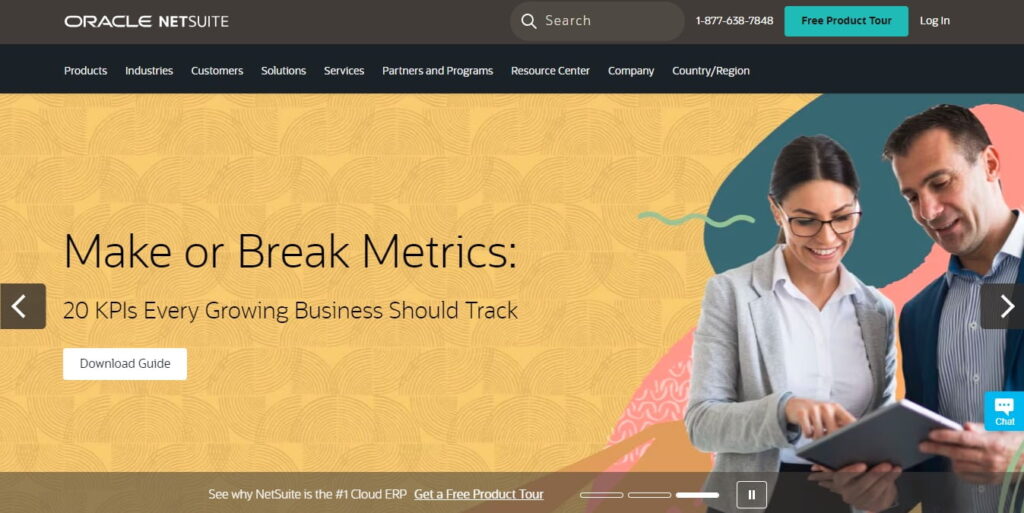
Next on our list of the best Dynamics 365 alternatives is Oracle NetSuite. It is a cloud-based ERP (Enterprise Resource Planning) solution that integrates various business functions like financials, CRM, inventory, and more into a single platform. Hence, it provides real-time visibility and control over business operations.
Developers have designed NetSuite to scale with businesses as they grow. So, its modular structure allows for the easy addition of functionalities, making it suitable for both small businesses and large enterprises. Additionally, it offers a comprehensive suite of applications covering ERP, CRM, e-commerce, and more. Hence, it provides a unified solution for various business needs.
NetSuite was built as a cloud-native platform, providing inherent advantages in terms of accessibility, scalability, and reduced IT infrastructure costs. Since Dynamics 365 also offers these advantages, it makes NetSuite a great alternative with similar benefits but in another platform. This can lead to faster adoption and ROI for businesses, making it a strong choice for businesses with international operations.
4. Pipedrive
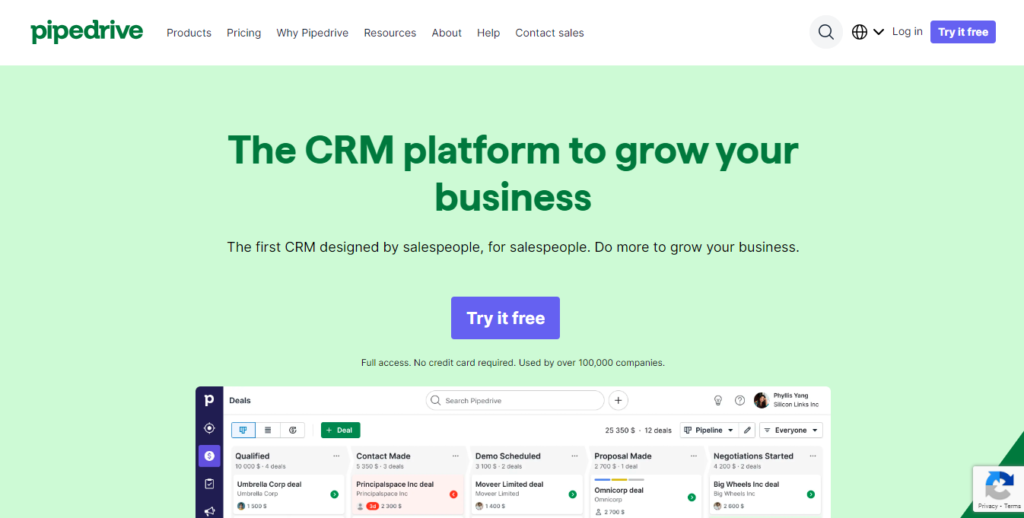
Pipedrive is a powerful CRM tool, that can become one of the amazing Dynamics 365 alternatives. Since its core strength lies in managing sales pipelines, Pipedrive offers a visual and customizable pipeline view. In this context, the platform allows users to track deals, move them through stages, and prioritize tasks efficiently.
Moreover, Pipedrive provides automation features that help streamline repetitive tasks, automate workflows, and send personalized email sequences. While it’s not as extensive as some other CRMs, Pipedrive does offer customization options. Hence, the users can adapt the system to their specific sales processes and needs.
On the one hand, it primarily focuses on sales pipeline management and sales team efficiency. On the other hand, it comes at a lower price point compared to Dynamics 365, which can be advantageous for businesses with budget constraints. Otherwise, Pipedrive’s straightforward design and user-friendly interface make it a preferable option for smaller businesses. So, users have a clear view of their sales process at a glance.
5. Zoho CRM
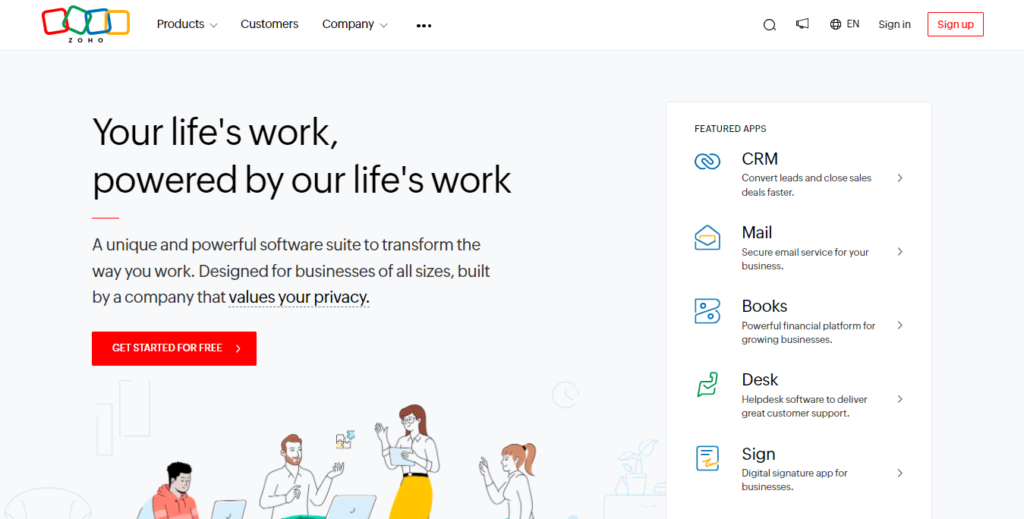
Zoho is also among the best Dynamics 365 alternatives. It is popular for cost-effectiveness, offering various pricing tiers that cater to businesses of different sizes, including a free version with essential features. Moreover, Zoho CRM offers a high level of customization, allowing businesses to tailor the platform to fit their unique processes and workflows.
On the other hand, it integrates with a wide range of third-party applications, providing flexibility. Hence, these very integrations allow multiple businesses to connect Zoho CRM with other tools for a more comprehensive business ecosystem. Additionally, it includes automation features that help streamline processes, automate repetitive tasks, and set up workflow rules to improve productivity.
Zoho CRM is well-suited for small and medium-sized businesses. Hence, the platform offers functionalities that are according to the company’s specific needs and provides a balance between features and simplicity. Its straightforward setup and implementation process allow for faster adoption, which can lead to quicker ROI for businesses.
6. Monday.Com
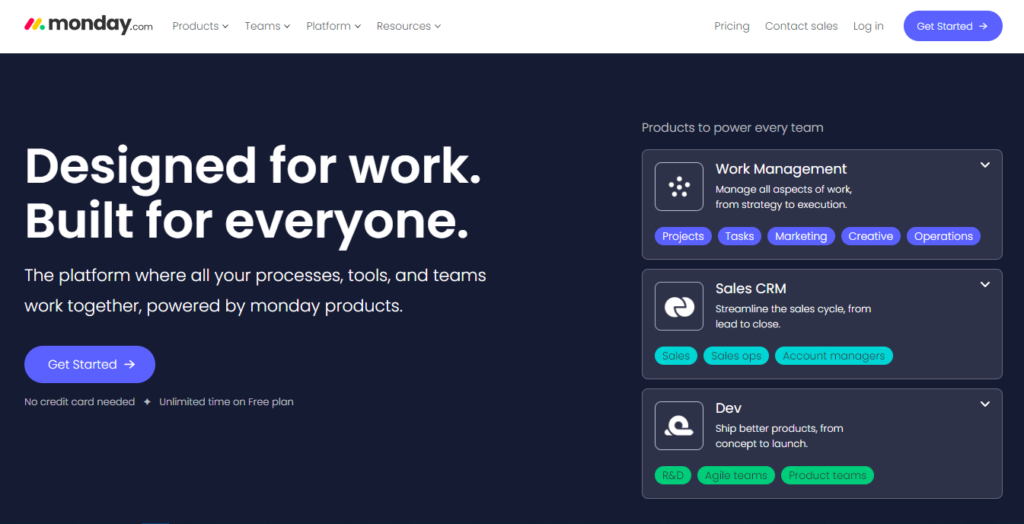
Last, we have Monday.Com which provides a highly visual and intuitive interface for managing projects, tasks, and workflows. Its visual boards and customizable layouts make it easy to track progress and collaborate effectively. Like Dynamics 365, it offers extensive customization options, allowing teams to create boards, workflows, and automation. Hence, businesses can tailor settings to their specific needs.
Monday.com emphasizes team collaboration and communication. It focuses on providing teams with features, such as @mentions, comments, file sharing, and integrations with communication tools, fostering teamwork and transparency. Plus, people praise it for its user-friendly interface and ease of adoption, making it accessible for teams across different departments and skill levels.
On the other hand, Monday.com is primarily a project management and collaboration tool, focusing on tasks, projects, and team collaboration. This focus on specific functionalities might be advantageous for teams seeking dedicated project management capabilities without the complexity of a broader suite. Plus, its visual and customizable nature gives a clear overview of projects and tasks, aiding in better project tracking and management.
Endnote
MS Dynamics 365 is a highly versatile and productive platform for CRM and ERP solutions. But if you don’t find it as profitable as other companies, you have many best Dynamics 365 alternatives too. Your company can benefit from Salesforce, Zoho, Pipedrive, HubSpot, NetSuite, or Monday.com. Select a solution that attracts you the most and give it a try. We hope it will solve your problem.
